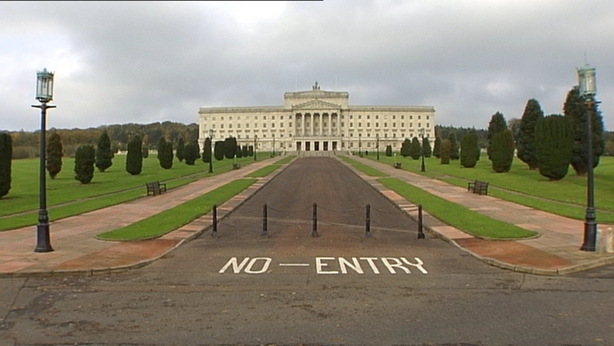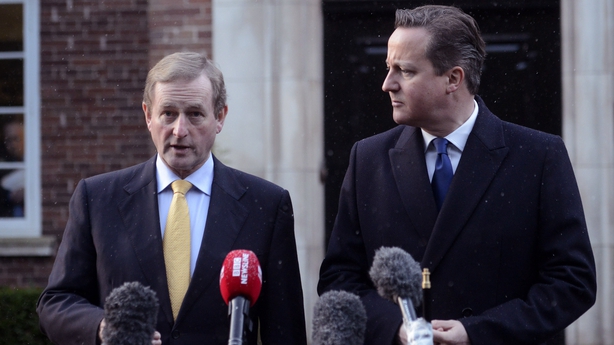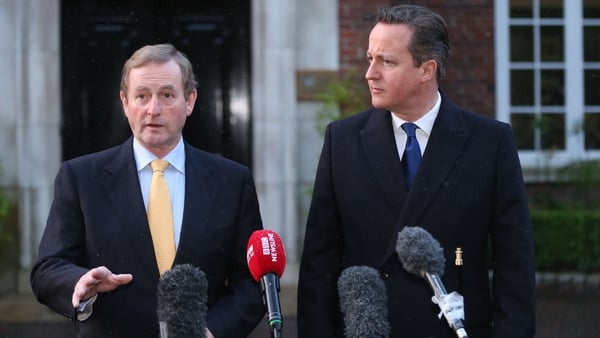Sinn Féin President Gerry Adams has said he believes a deal can be made at the political talks, involving Northern Ireland's five main parties that are due to resume in Belfast tomorrow.
Speaking to RTÉ News, Mr Adams said some progress has been made in the negotiations and while he does not want to be overly-optimistic, there is no point in being involved in talks except to bring them to a successful conclusion.
He said he has some sense that the talks have a focus and said that if those involved come up to the plate, the negotiations can be brought forward in the next short period.
The talks, chaired by Secretary of State for Northern Ireland Theresa Villiers and Minister for Foreign Affairs, Charlie Flanagan, are due to resume at Stormont House tomorrow morning.

On Friday the five parties (the DUP, the Ulster Unionists, Sinn Fein, the SDLP and Alliance) achieved what Charlie Flanagan described as a significant breakthrough, when, for the first time, they agreed a common position on handling the public finances, including welfare reform.
Following this morning's breakthrough all parties in Northern talks are fully engaged & committed to working hard to bridge the gap.
— Charlie Flanagan (@CharlieFlanagan) December 19, 2014However they have yet to reach a compromise on unresolved issues following negotiations last year, chaired by US diplomat, Richard Haass.
The matters still to be agreed include flags, parades and how to address the legacy of the past.
The five parties have asked British Prime Minister David Cameron, to provide a £2billion package of loans and grants over ten years, to help the restructuring of Northern Ireland's economy and the peace process.
Mr Cameron is expected to give his response in the next 48 hours.
He is unlikely to commit any funding from the British government, unless the parties reach agreement of all the problems on the negotiations agenda.
The Government is being asked to recommit funding to a proposed motorway linking Monaghan to Derry as part of any new agreement.
This contribution was put on hold as part of the cutbacks introduced by the Fine Gael-Labour administration. However, Taoiseach Enda Kenny, has indicated the matter might be re-examined.
An EU component might form part of any revised funding package.
The two unionist parties, the DUP and the UUP, have also asked the Government to set up some process to examine claims that the authorities, south of the border, were acquiescent towards some of the murders of Protestants that took place in border areas during The Troubles.
US diplomats are closely monitoring developments in the negotiations.
Former Senator Gary Harte, the Northern Ireland Envoy appointed by Secretary of State John Kerry, was in Belfast to meet all the parties two weeks ago and he is in telephone contact with the participants.
A diplomat from the US consulate in Belfast Greg Burton, has been at Stormont throughout the negotiations and Kevin O' Malley, the new US ambassador in Dublin, who was appointed by President Obama, is also monitoring the talks.
This is the first set of Northern Ireland negotiations, in which the David Cameron and Enda Kenny led-administrations have a co-chairing function.

All sets of talks, including and since the Good Friday Agreement in 1998, had a combination of Britain's Labour party and Fianna Fáil in central roles.
The latest major negotiations that led to an agreement on the devolution of Justice and Policing from Westminster to Stormont, included the involvement of the then British Prime Minister, Gordon Brown and his Irish counterpart, Brian Cowen.
At that time of those decisive talks in early 2010, Micheál Martin was the Minister for Foreign Affairs and the Shaun Woodward the Secretary of State for Northern Ireland.

